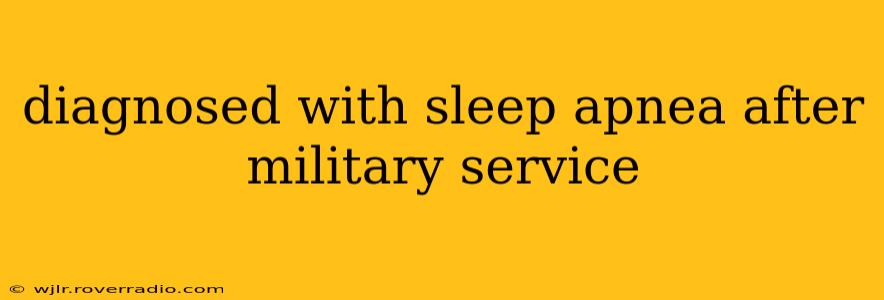Many veterans face unique health challenges after their service, and sleep apnea is unfortunately one of them. The demanding physical and mental stresses of military life, combined with potential exposure to certain factors, can significantly increase the risk of developing this serious sleep disorder. This article explores the link between military service and sleep apnea diagnosis, addressing common questions and offering guidance for veterans navigating this condition.
What is Sleep Apnea?
Sleep apnea is a potentially serious sleep disorder characterized by pauses in breathing or shallow breaths during sleep. These pauses can last from a few seconds to minutes and can occur repeatedly throughout the night, disrupting sleep and leading to various health problems. There are two main types: obstructive sleep apnea (OSA), the most common type, and central sleep apnea (CSA). OSA occurs when the airway becomes blocked during sleep, preventing air from reaching the lungs. CSA happens when the brain fails to send the proper signals to the muscles that control breathing.
How Does Military Service Increase the Risk of Sleep Apnea?
Several factors associated with military life contribute to a higher risk of sleep apnea among veterans:
- Shift work and irregular sleep schedules: The demanding nature of military service often involves irregular sleep patterns, shift work, and long hours, disrupting the body's natural sleep-wake cycle and increasing the likelihood of sleep apnea.
- Stress and trauma: Military personnel experience high levels of stress and trauma, both during deployment and in their daily lives. Chronic stress can exacerbate sleep problems and contribute to the development of sleep apnea.
- Exposure to certain substances: Exposure to certain chemicals, such as those found in burn pits, may contribute to respiratory issues that increase the risk of sleep apnea. This is an area of ongoing research and investigation.
- Obesity: Weight gain is common among veterans, and obesity is a significant risk factor for sleep apnea. Changes in lifestyle and diet post-service can contribute to this.
- Head injuries: Traumatic brain injuries (TBIs), common in military service, can affect breathing patterns and increase the risk of sleep apnea.
Is Sleep Apnea Common Among Veterans?
While precise statistics are difficult to pinpoint, research suggests a significantly higher prevalence of sleep apnea among veterans compared to the general population. The factors listed above likely contribute to this increased risk.
How is Sleep Apnea Diagnosed After Military Service?
The diagnosis of sleep apnea typically involves a sleep study, also known as a polysomnography. This test monitors various physiological functions during sleep, such as breathing patterns, heart rate, and brainwave activity. Your doctor may also conduct a physical exam and review your medical history. Veterans can access sleep studies through the VA healthcare system or private providers.
What Treatment Options are Available for Veterans with Sleep Apnea?
Treatment options for sleep apnea vary depending on the severity of the condition. Common treatments include:
- Continuous Positive Airway Pressure (CPAP): This is the most common treatment, involving a mask that delivers a continuous stream of air to keep the airway open during sleep.
- Oral appliances: Custom-made mouthguards can help reposition the jaw and tongue to maintain an open airway.
- Surgery: In some cases, surgery may be necessary to correct anatomical issues contributing to sleep apnea.
- Lifestyle changes: Weight loss, avoiding alcohol and sedatives before bed, and adopting good sleep hygiene practices can significantly improve sleep apnea symptoms.
Can the VA Help Veterans with Sleep Apnea?
Yes, the Department of Veterans Affairs (VA) provides comprehensive healthcare services for veterans, including diagnosis and treatment of sleep apnea. Veterans should contact their local VA healthcare facility to schedule an appointment and discuss their sleep apnea concerns. They can access sleep studies, CPAP machines, and other treatments through the VA healthcare system.
What are the Long-Term Health Risks of Untreated Sleep Apnea?
Untreated sleep apnea can lead to numerous serious health complications, including:
- Cardiovascular disease: Sleep apnea increases the risk of high blood pressure, heart attack, stroke, and other heart problems.
- Type 2 diabetes: Sleep apnea is linked to an increased risk of developing type 2 diabetes.
- Cognitive impairment: Sleep deprivation due to sleep apnea can impair cognitive function, leading to difficulties with concentration, memory, and decision-making.
- Mood disorders: Sleep apnea is associated with an increased risk of depression and anxiety.
- Motor vehicle accidents: Excessive daytime sleepiness caused by sleep apnea significantly increases the risk of motor vehicle accidents.
Where Can Veterans Find Support and Resources for Sleep Apnea?
Several organizations offer support and resources for veterans with sleep apnea:
- The Department of Veterans Affairs (VA): The VA provides comprehensive healthcare services for veterans, including diagnosis and treatment of sleep apnea.
- Veteran-specific support groups: Many online and in-person support groups specifically cater to veterans facing health challenges, including sleep apnea. These groups can provide a sense of community and shared experience.
- Sleep apnea support groups: General sleep apnea support groups can provide valuable information and support, connecting individuals with others facing similar challenges.
It's crucial for veterans diagnosed with sleep apnea to actively manage their condition. By seeking timely diagnosis and treatment, veterans can improve their sleep quality, overall health, and quality of life. The information provided here is for general knowledge and should not be considered medical advice. Veterans should consult with their healthcare provider for personalized guidance and treatment options.
